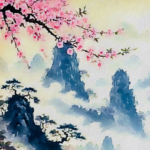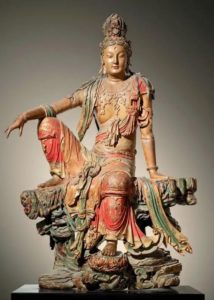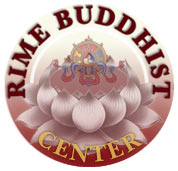 This class is open to anyone who feels called to explore the Bodhisattva path and is contemplating taking the Bodhisattva vows. These vows express a heartfelt commitment to cultivate wisdom and compassion for the benefit of all beings. Together, we will gently explore the what, why, and how of the Bodhisattva vows, offering clarity and confidence before making this meaningful commitment.
This class is open to anyone who feels called to explore the Bodhisattva path and is contemplating taking the Bodhisattva vows. These vows express a heartfelt commitment to cultivate wisdom and compassion for the benefit of all beings. Together, we will gently explore the what, why, and how of the Bodhisattva vows, offering clarity and confidence before making this meaningful commitment.
The Bodhisattva Vows will be conferred on May 3rd during the Sunday Service.
Please note: Both the class and the vows will be in-person only.
If you feel drawn to take the Bodhisattva vows, we warmly invite you to complete the interest form and submit it.
Instructor: Lama Matthew Palden Gocha
Date: Two Session beginning on Wednesday, April 22, 2026
Time: 7:45 pm
Class Fee: Free
Text: Bouquet of Radiant Flowers, Chapter 2: Cherry Blossoms
Prerequisite: Basics of Buddhism and Refuge Vows
 This challenge will be practice intensive for those who want to apply their understanding of Bodhicitta with daily practice. We welcome new students who are looking to learn about the Bodhisattva Mind Training and how to apply it to their Buddhist path, as well as experienced students who have insights to share. This event will be in-person with an online option available.
This challenge will be practice intensive for those who want to apply their understanding of Bodhicitta with daily practice. We welcome new students who are looking to learn about the Bodhisattva Mind Training and how to apply it to their Buddhist path, as well as experienced students who have insights to share. This event will be in-person with an online option available.
“Peace and happiness can be attained, but not by searching for something in the outside world. They start within us then extend out to the entire globe.” – Khentrul Rinpoche
“The Tibetan word lojong literally means ‘mind training’ but the practice really has more to do with training our attitude, training us out of the habitual ways that we respond to situation that happen to us, especially adverse circumstances.” – Jetsunma Tenzin Palmo
The main book that will be used for the challenge will be The Power of Mind: A Tibetan Monk’s Guide to Finding Freedom in Every Challenge by Khentrul Lodrö T’hayé Rinpoche. The Power of Mind guides the reader through transformative practices one by one—from recognizing the value of our human life to overcoming the sources of suffering, together with meditation advice for incorporating these insights into our daily lives.
Register today!
This event will be in-person with an online option available.
Unable to afford the class, but want to attend. Email Lama Matt for the promo code.
Kick off party for the 108 Day Bodhisattva Challenge is Sunday January 4, 2026 at 10:30am and will be during the Sunday Service.
Sunday Dharma Talks beginning January 4th
Each week kicks off a new topic with a Sunday Dharma talk given by Lama Matt and the other Dharma Facilitators. Dharma Talks will be uploaded to the Rime Center’s Podcast each Monday. Participants are then encouraged to read the topic from the book.
Wednesday Online Discussions beginning January 7th
Participants will meet either in-person or online Wednesdays at 7:45 pm to discuss the week’s topic. There will be ample opportunity for questions and discussion about the practice that will include actions that can be applied to daily life/practice.
Join us as we explore the rich repository of Buddhist Sutras, Pali Canon, Chinese Ta-ts’ang-ching, and Tibetan Kangyur every first Sunday of the month after the Sunday Service. Sūtra (Pali. sutta) means ‘something that was heard from someone else’ and usually connotes ‘a discourse’.
In this chapter of the Sūtra, the sūtra concludes with the Buddha praises the sūtra’s power and entrusts it to future generations. Upholding and sharing this teaching is declared a profound act of merit and compassion.
Facilitators: Lama Matthew Rice (Lobpön Palden Gocha) and Daniel Scharpenburg
Text: The Noble Mahāyāna Sūtra “The Teaching of Vimalakīrti” Chapter 12
Join us as we explore the rich repository of Buddhist Sutras, Pali Canon, Chinese Ta-ts’ang-ching, and Tibetan Kangyur every first Sunday of the month after the Sunday Service. Sūtra (Pali. sutta) means ‘something that was heard from someone else’ and usually connotes ‘a discourse’.
In this chapter of the Sūtra, Vimalakīrti reveals his origin in the pure land of Akṣobhya, demonstrating that pure lands are not distant realms but expressions of realization. Purity is a matter of perception, not location.
Facilitators: Lama Matthew Rice (Lobpön Palden Gocha) and Daniel Scharpenburg
Text: The Noble Mahāyāna Sūtra “The Teaching of Vimalakīrti” Chapter 11
Join us as we explore the rich repository of Buddhist Sutras, Pali Canon, Chinese Ta-ts’ang-ching, and Tibetan Kangyur every first Sunday of the month after the Sunday Service. Sūtra (Pali. sutta) means ‘something that was heard from someone else’ and usually connotes ‘a discourse’.
In this chapter of the Sūtra, the Buddha teaches the difference between conditioned, impermanent forms and the indestructible nature of awakening. Bodhisattvas move freely within appearances while remaining rooted in the unborn.
Facilitators: Lama Matthew Rice (Lobpön Palden Gocha) and Daniel Scharpenburg
Text: The Noble Mahāyāna Sūtra “The Teaching of Vimalakīrti” Chapter 10
Join us as we explore the rich repository of Buddhist Sutras, Pali Canon, Chinese Ta-ts’ang-ching, and Tibetan Kangyur every first Sunday of the month after the Sunday Service. Sūtra (Pali. sutta) means ‘something that was heard from someone else’ and usually connotes ‘a discourse’.
In this chapter of the Sūtra, an inconceivable feast nourishes the assembly, symbolizing the Dharma as sustenance beyond material form. True nourishment is freedom from grasping, even toward spiritual experiences.
Facilitators: Lama Matthew Rice (Lobpön Palden Gocha) and Daniel Scharpenburg
Text: The Noble Mahāyāna Sūtra “The Teaching of Vimalakīrti” Chapter 9
Join us as we explore the rich repository of Buddhist Sutras, Pali Canon, Chinese Ta-ts’ang-ching, and Tibetan Kangyur every first Sunday of the month after the Sunday Service. Sūtra (Pali. sutta) means ‘something that was heard from someone else’ and usually connotes ‘a discourse’.
In this chapter of the Sūtra, Bodhisattvas explain nonduality in many ways—beyond self/other, samsara/nirvana, purity/impurity—until Mañjuśrī asks Vimalakīrti for his teaching. Vimalakīrti responds with profound silence, embodying nonconceptual wisdom.
Facilitators: Lama Matthew Rice (Lobpön Palden Gocha) and Daniel Scharpenburg
Text: The Noble Mahāyāna Sūtra “The Teaching of Vimalakīrti” Chapter 8
Join us as we explore the rich repository of Buddhist Sutras, Pali Canon, Chinese Ta-ts’ang-ching, and Tibetan Kangyur every first Sunday of the month after the Sunday Service. Sūtra (Pali. sutta) means ‘something that was heard from someone else’ and usually connotes ‘a discourse’.
In this chapter of the Sūtra, afflictions themselves become the “family” of awakening, for without suffering there would be no compassion or path. Bodhisattvas transform defilements into wisdom rather than rejecting them.
Facilitators: Lama Matthew Rice (Lobpön Palden Gocha) and Daniel Scharpenburg
Text: The Noble Mahāyāna Sūtra “The Teaching of Vimalakīrti” Chapter 7
Join us as we explore the rich repository of Buddhist Sutras, Pali Canon, Chinese Ta-ts’ang-ching, and Tibetan Kangyur every first Sunday of the month after the Sunday Service. Sūtra (Pali. sutta) means ‘something that was heard from someone else’ and usually connotes ‘a discourse’.
In this chapter of the Sūtra, a goddess challenges fixed views of gender and identity, revealing that all distinctions are empty. Her playful yet incisive teaching dismantles attachment to form, status, and conceptual hierarchy.
Facilitators: Lama Matthew Rice (Lobpön Palden Gocha) and Daniel Scharpenburg
Text: The Noble Mahāyāna Sūtra “The Teaching of Vimalakīrti” Chapter 6
Join us as we explore the rich repository of Buddhist Sutras, Pali Canon, Chinese Ta-ts’ang-ching, and Tibetan Kangyur every first Sunday of the month after the Sunday Service. Sūtra (Pali. sutta) means ‘something that was heard from someone else’ and usually connotes ‘a discourse’.
In this chapter of the Sūtra, Vimalakīrti demonstrates teachings that defy conceptual limits—rooms that contain multitudes, stillness amid activity, and freedom within form—showing liberation that is not separate from everyday life.
Facilitators: Lama Matthew Rice (Lobpön Palden Gocha) and Daniel Scharpenburg
Text: The Noble Mahāyāna Sūtra “The Teaching of Vimalakīrti” Chapter 5
 This class is open to anyone who feels called to explore the Bodhisattva path and is contemplating taking the Bodhisattva vows. These vows express a heartfelt commitment to cultivate wisdom and compassion for the benefit of all beings. Together, we will gently explore the what, why, and how of the Bodhisattva vows, offering clarity and confidence before making this meaningful commitment.
This class is open to anyone who feels called to explore the Bodhisattva path and is contemplating taking the Bodhisattva vows. These vows express a heartfelt commitment to cultivate wisdom and compassion for the benefit of all beings. Together, we will gently explore the what, why, and how of the Bodhisattva vows, offering clarity and confidence before making this meaningful commitment.

